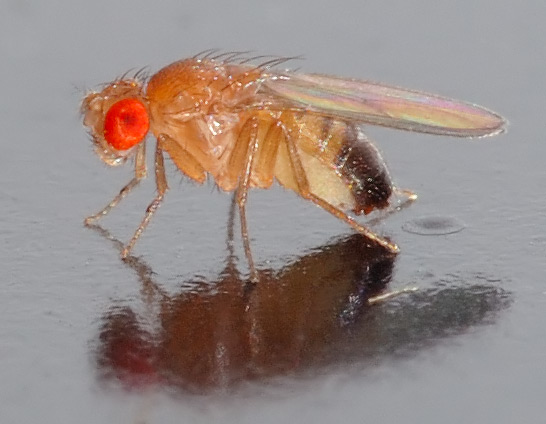Starved fruit-flies sleep for fewer hours and perform better on learning tasks than fully-fed but sleep-deprived ones, according to new research published in the journal PLoS Biology.
 Studying the sleeping pattern of flies that are genetically predisposed to be extremely sensitive to a lack of sleep (these flies have previously been shown to die after just 10 hours of being sleep-deprived) scientists at Washington University School of Medicine in St. Louis found that when the flies stayed awake due to starvation rather than being kept awake by constant stimulation, they survived nearly three times longer.
Studying the sleeping pattern of flies that are genetically predisposed to be extremely sensitive to a lack of sleep (these flies have previously been shown to die after just 10 hours of being sleep-deprived) scientists at Washington University School of Medicine in St. Louis found that when the flies stayed awake due to starvation rather than being kept awake by constant stimulation, they survived nearly three times longer.
When put in a maze with paths leading to either a positive or adverse outcome, starved flies were more likely (on repeated occasions) to choose the path leading to the positive outcome, indicating that they were better at learning. Furthermore, once these flies were returned to a normal diet, they demonstrated less need to pay off a sleep debt than their well-fed counterparts
The researchers also show that the ability to resist the negative effects of sleep-deprivation is linked to a protein that helps in the regulation and storage of lipids (a group of molecules which includes fats and fat soluble vitamins). When they disabled a gene known as Lipid storage droplet 2 (Lsd2), the researchers found that this produced the same effects as starvation - more alert flies, with less need for sleep. It is well known that sleep can have an effect on fat storage, with many studies showing that sleep-deprived humans are more likely to suffer from obesity, but this study suggests that there is a complex relationship between dietary metabolism and sleep. Unravelling this interaction may help us to find a way to stay sharp and work well, all through the night.
- Previous Anti-malarials bite back
- Next Nature's emergency call










Comments
Add a comment